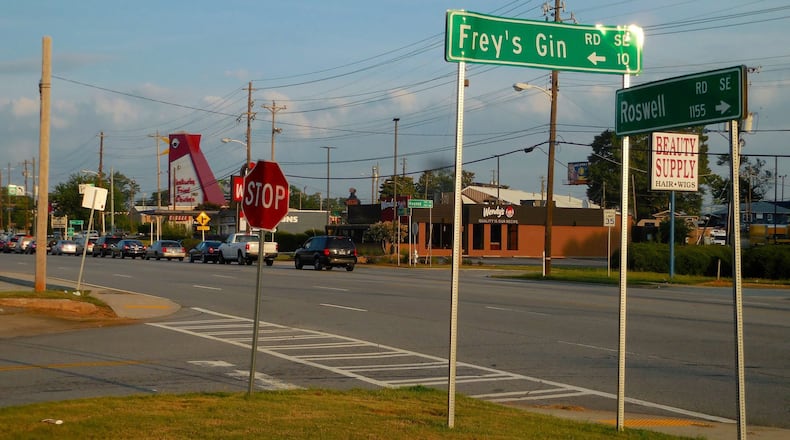Howdy! This is "Actual Factual Cobb," and thus is much better than the rest of the Internet. In this column series, I — Ben Brasch — will keep rootin' for answers and tootin' news about Cobb County from questions you ask until the esteemed AJC fires me upon realizing how much of the newsroom's coffee budget is expended on me.
Larry asked: "What is the origin of 'Frey's Gin' Road? I understand that's where Leo Frank was lynched. There are also other roads with the 'Gin' reference — I just don't know what the term implies."
The "gin" refers to a machine that separates seeds from cotton — ya know, Eli Whitney and such. The "Frey" is a family name that refers to William Frey, who owned the gin.
In Gwinnett County, there's Webb Gin Road. My colleague Tyler Estep eloquently explains what the deal is there: "Back in the late 1800s/early 1900s, there was a guy named Rev. Andrew J. Webb. He had a cotton gin, and the predecessor of the modern day road was how farmers got to it. It was, quite simply, the road that led to Webb's gin house."
Mystery solved there.
But Larry’s question brings up another, much darker mystery — the type of mystery that begat books, international intrigue and half-whispered history lessons.
Who murdered Leo Frank?
The night of Aug. 16, 1915, a gang of more than 20 unknown men broke Frank out of the jail farm in Milledgeville and lynched the Jewish man at sunrise on William Frey’s Marietta property because they could.
Frank had been wrongfully accused of killing 13-year-old Mary Phagan, who worked at the pencil factory Frank ran. Gov. John M. Slaton commuted Frank two days before the execution.
People rioted over Slaton's decision. When his term ended days later, police escorted the governor and his wife to the train station where they left and didn't return for a decade.
Frey, the ex-sheriff, found Frank’s body swinging from the limb of a hollow oak in the heart of the thicket adjoining Frey’s ginhouse.
The whole scene was a stone’s throw away from where Phagan had lived with her parents
You can see the Big Chicken from where a sign stands commemorating the hanging at Frey's Gin and Roswell roads.
As a part of Kennesaw State University's Cobb County Oral History Series, the school — which has a Frey Lake because the family donated land — interviewed John Steve Frey Sr.
In a transcript, the man said his father was first cousin to William Frey.
And at age 90 during the 1988 interview, the man was able to relay lots of Cobb County history, including the day Leo Frank was killed on his kin’s property.
He was 17.
"They cut the lowest branches and sold them,” he told the interviewer.
He went on. “I seen the body. They went down Atlanta Street.”
The man said he understood that the original plan was to hang Frank at Phagan’s grave in the city cemetery but the sun was rising and they didn’t want to get caught.
“Well, they seen they weren’t gonna make it,” he said.
Steve Oney, former AJC writer and recognized expert-author on Frank's murder, addressed that point in an interview with the Marietta Daily Journal in 2015 to mark the 100th anniversary of the hanging.
“No. They lynched him exactly where they intended to. There was a table waiting for them in the woods when they got to the grove at Frey’s Gin. And that was the only equipment they needed, except a rope,” he said. “Another thing: (former Sheriff William) Frey owned the land. And you weren’t going to lynch someone on private property if you hadn’t cleared it with the owner. That would have opened the door to too much trouble.”
Why bother killing Frank?
"He operated a sweatshop. He employed teenage girls. A Jewish industrialist with an Ivy League degree. He played into the worst dynamic you can imagine," Oney told the AJC for a 100-year anniversary story.
It's said many around town knew exactly who the lynchers were, and even some unofficial lists of names that included prominent city leaders circulate over the years,but only Marietta’s reputation paid the price.
There you have it, Larry. It's a good reminder that a road can be much more than just a road.
I, Ben Brasch, am a reporter with the AJC. To submit “Actual Factual Cobb” questions, contact me at ben.brasch@ajc.com or on Twitter at @ben_brasch, or via the form below.
About the Author
Keep Reading
The Latest
Featured


